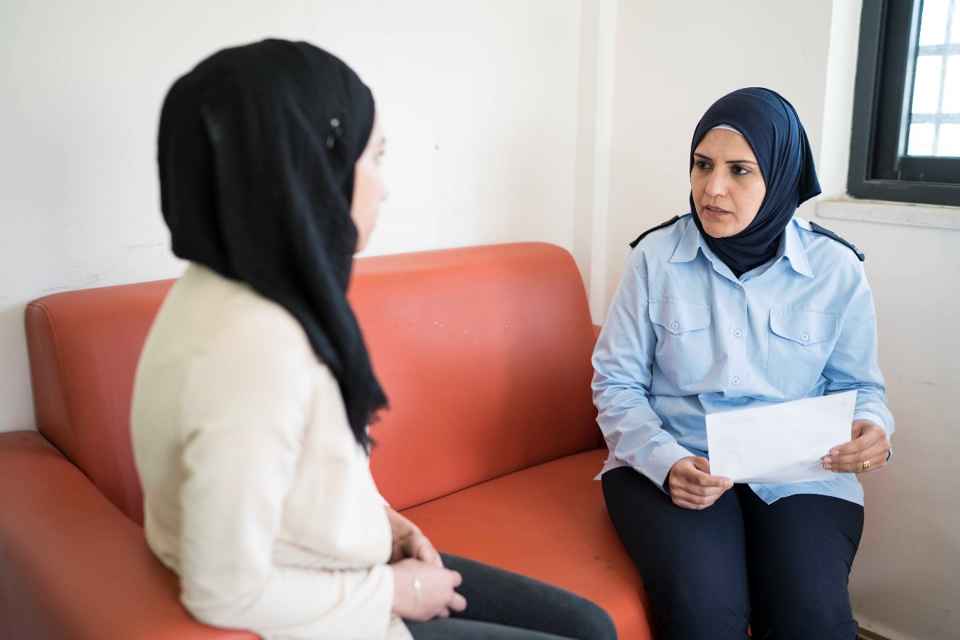Survivors of Gender-Based Violence Supported by Justice Services in the West Bank
Date:
Survivors and victims of violence are more knowledgeable and aware of multi-sectoral quality gender-based violence services as well as ensuring access and quality of these services, through interventions by UNODC through the HAYA Joint Programme.

“At first, I had a strong and nervous reaction to what was happening, and I was not able to stand it.”
Forty-year-old Nada* tells of being subjected to verbal and physical violence by a man at her local village council, where she had gone to demand her right to inheritance as the only daughter, a right denied her by her brothers following the passing of her parents.
Already suffering verbal and psychological abuse by her brothers, this attack by a man who did not agree with her asserting her right was a scary experience. But Nada decided she would not remain silent.
“I was provided with the number of the Free Family Protection Unit 106, after which I went to their headquarters and filed a complaint concerning the case, violence, and attack,” explains Nada. Nada says that she was listened to and the next day, the man was arrested for assault.
While each case is different and dealt with accordingly, the majority of survivors are women and girls, explains Colonel Natour who works with the Family Protection Unit (FPU) on gender-based-violence (GBV) cases. “At first when you begin working in this work, you feel there are a lot of people that are subjected to violence and are silent or they are subjected to violence, and no one helps them.” Colonel Natour explains that the priority is to get the survivor and her family members to a safe place where they can record details of the case and file an official complaint. A file is prepared within the first twenty-four hours and the case transferred to the Family Prosecution.
Colonel Natour emphasizes challenges to eliminating and responding to violence against women and girls in the West Bank include masculine mentalities, outdated laws, and restrictions of access due to the Israeli occupation. “We in the FPU need to keep making the effort because by protecting this person, you protect an entire family, and then an entire community.”
Nada encourages other survivors of violence to follow her lead. “The services are excellent. It was a positive thing to know about the services that support women subjected to violence. It is important to be aware of the services that are available and how easy they are to access.”
Although difficult, Nada says that the experience has made her feel empowered, and she has learned never to be silent. “I became better and stronger than before and decided not to give up my right to my inheritance. I continue to demand this right, and I do not allow anyone to be subjected to any violence anywhere,” asserts Nada. “I will defend myself with all my strength and daring, without fear and anxiety.”
In the West Bank and Gaza Strip, one in three women who have ever been married are subjected to physical violence by their husbands and one in seven of never married women by a household member. According to the most recent violence survey, over half of these women chose to remain silent and only 17 per cent of children experiencing violence from a parent or close relative seek help from a teacher.
These statistics are further compounded by the reality that more than half of women in the West Bank and Gaza Strip are unaware of the existence of GBV services provided by civil society organizations available to help. Of those aware, only 1.4 per cent of women who have ever been married seek help from psychosocial and legal services, 3 per cent from a lawyer, and 1 per cent from the Palestinian Police or FPU.
Together with its ministerial and local partners and in partnership with health care, psychosocial, shelter, and legal and justice service providers, the HAYA Joint Programme is seeking to help others like Nada.
The HAYA Joint Programme works on advocating for prevention and response to GBV, increasing awareness of GBV services, and ensuring access to, and use and quality of these services. “Through the HAYA Joint Programme, the UNODC has established a forensic clinic in the One Stop Centre in the West Bank, where all GBV services are available to survivors in one place, saving time, effort, and ensuring confidentiality is maintained, says Mutasem Awad, Project Manager for the HAYA Joint Programme, the United Nations Office on Drugs and Crime (UNODC). “We are also raising awareness on the FPU helpline to help other survivors of violence know where they can receive support.”
Survivors of violence in the West Bank can contact justice services by calling 100 for the Palestinian police, through the direct FPU helpline at 106, operational twenty-four hours a day, seven days a week throughout the year, or by going to the FPU headquarters or closest police, security, or municipal building as well as local women’s organizations available to help.
*Nada is an alias used to maintain privacy and confidentiality.
For the full directory of available GBV services, please clickhere.
Funded by the Government of Canada and jointly implemented by UN Women, UNFPA, UN-Habitat, and UNODC, the HAYA Joint Programme seeks to end violence against women and girls through various outreach and awareness-raising activities, to increase access to necessary services for survivors of violence, as well as to strengthen the institutional capacity of government officials to develop and implement legal and policy frameworks promoting and protecting women’s and girls’ rights to live free from violence.